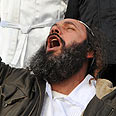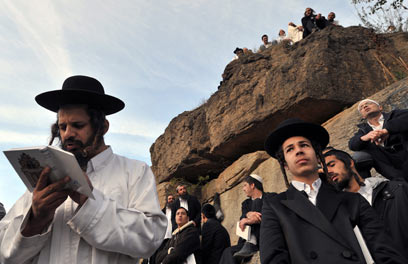
Rabbi rolling in his grave
Pot parties, as much alcohol as you can drink and Ukrainian girls wearing next to nothing – Uman, anything but the Breslov way
Ukraine – Hasidic followers are not the only ones making the annual pilgrimage to Rabbi Nachman of Breslov's gravesite in the Ukrainian city of Uman. The past few years have seen the site become a booming tourist attraction – and with tourists come the tourist attractions.
Alcohol, drugs and aggressively offered escort services are found in abundance in the perimeter adjacent to the gravesite, making for a pitfall of sins for the devout visitor.
As affordable as trips to Uman are, it is no wonder the city – complete with a rabbi's grave to visit for the sake of good karma – has become one of the hottest tourist attraction for Israelis. The sacred pilgrimage site is now a must-see spot for tourists looking for anything but spiritual self-searching, especially around the holidays.
"There are many people for whom Rosh Hashana is just an excuse to get away from the wife for a week," N. a veteran of the Uman scene, told me. "I see groups of younger and older people, who definitely care about visiting the grave, but care more about the social scene."
But what about the sanctity of the gravesite? The problem seems to stem from the harsh poverty plaguing Uman, whose residents are in constant search of ways to capitalize off tourists.
Locals are willing to chauffeur tourists around Ukraine, rent rooms in their homes – sometimes for steep prices – and the streets are never short of ladies of the night offering their company for the right price.
"Many of the apartments turn into marijuana dens," a haredi reporter who visited Uman this year said. "(The tourists) get drunk and go looking for trouble. Many of the locals sell marijuana, and after all, Israel is going through a light-drugs dry spell."
Connections in high heavens
Uman became a popular pilgrimage site over 200 years ago. Rabbi Nachman of Breslov promised his disciples to pray for their souls if they spent the High Holidays with him, and before his death, he announced that those visiting his gravesite in Rosh Hashana would see favoritism in heaven. And so a tradition was born.
Before the fall of the Iron Curtain, local Hasidim would sneak into the then-neglected gravesite, but it was not until the fall of the Soviet Union in the late 1980s that followers began flocking to Uman. Today, the annual trip is a must for disciples, celebrities and the average Joe alike.
Uman is a rural town. In the week leading to Rosh Hashana, the street leading to the gravesite turned into a market, where locals sell anything and everything. The local currency is severely devalued and the proceeds can last them for months.
Reformation a-la Breslov
The eve of the Jewish New Year in Uman. I see several young men, dancing and singing in praise of the rabbi. A closer look reveals a slew of piercings and tattoos – not exactly your run of the mill devotees.
"Oh, you know, we try our best," says one of them. "People like me come here too and that's good. I don't see myself becoming religious or anything, but we'll come here next year, too."

Rabbi Nachman of Breslov's gravesite (Photo: AFP)
The Breslov hasidic court is always welcoming to those who reform, a fact that attracts people from all walks of life to the rabbi's gravesite.
After recent years have sprouted rumors that some of those arriving at the site left with their faith shaken rather then bolstered – courtesy of the local brothels – the Breslov hasidic court decided to put a stop to it: The method – a Breslov-appointed special Hasidic force. The means – beating those caught straying back into the fold. The result – short-lived, as the following year saw the brothel business booming once more.
In order to deal with the growing temptation, the Breslov hasidic court in Uman now features a giant tent meant to house visitors. The tent is guarded and any vendors or prostitute approaching it are turned away.
"That's probably the reason we hardly saw any girls there this year," one of the visitors said. "Still, whenever the daily fuss dies down, they fell comfortable enough to show up. Bedside, those bent on finding promiscuity will find it."
Alcohol is a completely different problem, one the "Breslov force" is unable to control. "Alcohol is sold in the streets here freely," said another visitor. "For the majority of people here, it ends with just getting a little drunk. Unfortunately, for some it means going out and looking for trouble.
"There is wine or spirits involved in many of the prayer services," he added. "I guess it's supposed to help reach that spiritual high."
- Follow Ynetnews on Facebook










